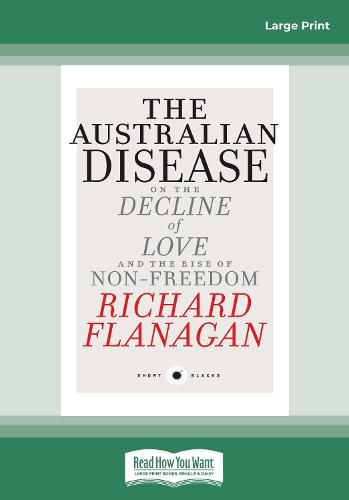Readings Newsletter
Become a Readings Member to make your shopping experience even easier.
Sign in or sign up for free!
You’re not far away from qualifying for FREE standard shipping within Australia
You’ve qualified for FREE standard shipping within Australia
The cart is loading…






Non-freedom to the Western mind is inevitably linked with images of backwardness - Soviet tractors, East German Trabants, Kim Jong Il’s haircut. But non-freedom these days is also iPads, iPhones and a dazzling array of less iconic but ubiquitous consumer goods that flood our stores, our homes and which increasingly are used to define our ideas of worth and happiness. It is a full-lipped smile achieved with the aid of collagen made from skin flensed from dead Chinese convicts. The Australian Disease is Richard Flanagan’s perceptive, hilarious, searing exposA © of the conformity that afflicts our public life. From Weary Dunlop to Vassily Grossman, from David Hicks to Craig Thomson, Flanagan takes us on a wildly entertaining and unsettling trip. If we are to find hope, he says, we must take our compass more from ourselves and less from the powerful.
$9.00 standard shipping within Australia
FREE standard shipping within Australia for orders over $100.00
Express & International shipping calculated at checkout
Non-freedom to the Western mind is inevitably linked with images of backwardness - Soviet tractors, East German Trabants, Kim Jong Il’s haircut. But non-freedom these days is also iPads, iPhones and a dazzling array of less iconic but ubiquitous consumer goods that flood our stores, our homes and which increasingly are used to define our ideas of worth and happiness. It is a full-lipped smile achieved with the aid of collagen made from skin flensed from dead Chinese convicts. The Australian Disease is Richard Flanagan’s perceptive, hilarious, searing exposA © of the conformity that afflicts our public life. From Weary Dunlop to Vassily Grossman, from David Hicks to Craig Thomson, Flanagan takes us on a wildly entertaining and unsettling trip. If we are to find hope, he says, we must take our compass more from ourselves and less from the powerful.